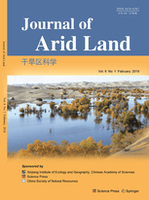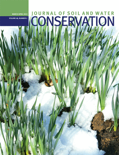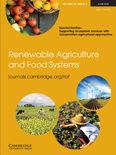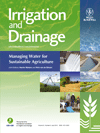
Revista Agrogeoambiental
Scope & Guideline
Empowering Agricultural Innovation for a Greener Future
Introduction
Aims and Scopes
- Agricultural Practices and Innovations:
Research on various agricultural techniques, including fertilization methods, crop management, and innovative practices that enhance productivity while minimizing environmental impact. - Biodiversity and Ecosystem Management:
Studies that examine species diversity, habitat conservation, and the ecological impacts of land use changes, particularly in Brazilian ecosystems such as the Atlantic Forest and Cerrado. - Climate Impact and Adaptation:
Investigations into how climatic phenomena affect agriculture and natural resources, exploring adaptive strategies for climate resilience in agricultural systems. - Soil and Water Management:
Research focused on soil health, water management practices, and their implications for crop yield and environmental sustainability. - Wildlife Conservation and Human Interactions:
Studies addressing the interactions between wildlife and agricultural landscapes, including roadkill analysis, wildlife corridors, and the impact of human activity on biodiversity.
Trending and Emerging
- Sustainable Fertilization Techniques:
An increasing focus on sustainable fertilization practices, such as biostimulants and organic amendments, indicates a shift towards environmentally friendly agricultural inputs. - Climate Change Adaptation Strategies:
Research exploring adaptation strategies for agriculture in response to climate change is gaining prominence, underscoring the urgency of addressing climatic impacts on food security. - Urban Agriculture and Green Spaces:
The rise in studies related to biodiversity in urban settings and the importance of green spaces reflects a growing recognition of urban ecology and its implications for conservation. - Technological Innovations in Agriculture:
The integration of technology, such as remote sensing and precision agriculture techniques, is increasingly featured, showcasing the role of technology in enhancing agricultural productivity and sustainability. - Ecological Restoration and Conservation Initiatives:
A growing emphasis on studies related to ecological restoration efforts and conservation strategies indicates a commitment to preserving biodiversity and ecosystem services.
Declining or Waning
- Traditional Herbicide Studies:
Research on conventional herbicide applications and their effects has decreased, possibly due to a growing interest in integrated pest management and organic farming practices. - General Crop Yield Studies:
While still relevant, broad studies on crop yields without specific innovations or sustainability practices appear less frequently, as the focus shifts toward more integrated approaches. - Historical Land Use Studies:
Research focusing solely on historical land use patterns without a contemporary application or analysis has become less prominent, indicating a trend towards applying historical insights to current sustainability challenges.
Similar Journals

Revista de Agricultura Neotropical
Advancing Tropical Agriculture Through Open Access ResearchRevista de Agricultura Neotropical, published by UNIV ESTADUAL MATO GROSSO SUL, serves as a pivotal platform for disseminating research in the fields of agronomy and crop science. Since its inception as an open-access journal in 2014, it has been dedicated to promoting innovative research and practical applications within the agricultural sector, specifically tailored to the challenges and dynamics of the tropical agriculture landscape in Brazil and beyond. Although currently positioned in the Q4 quartile of Scopus rankings, and with a modest agricultural science percentile, the journal actively encourages contributions that highlight sustainable agricultural practices, tropical crop management, and emerging technologies in farming. With its commitment to open access, the Revista de Agricultura Neotropical broadens the reach of critical knowledge, making it accessible to researchers, professionals, and students alike, thus fostering a collaborative environment for advancing agri-scientific initiatives.

Journal of Arid Land
Illuminating challenges and opportunities in dry environments.Journal of Arid Land, published by SPRINGER HEIDELBERG, is a pivotal platform dedicated to advancing knowledge in the fields of Earth-Surface Processes, Management, Monitoring, Policy and Law, and Water Science and Technology. With an ISSN of 1674-6767 and an E-ISSN of 2194-7783, this journal stands out as a prominent source of scholarly research focusing on the unique challenges and opportunities of arid and semi-arid environments, particularly relevant in the context of global climate change. As of 2023, it holds a commendable Q2 ranking in several critical categories, underscoring its impact in environmental science and related disciplines. The journal, which has been in publication since 2009 and is set to continue through 2024, provides unrestricted access to high-quality research that sheds light on sustainable practices and effective policies. With its focus on arid lands, the Journal of Arid Land plays an essential role in fostering interdisciplinary dialogue among researchers, practitioners, and policymakers striving to address the pressing issues faced by these ecosystems.

Folia Oecologica
Unveiling Insights into Our Natural World.Folia Oecologica is a distinguished open-access journal published by WALTER DE GRUYTER GMBH, focusing on critical research in the fields of agricultural and biological sciences, ecology, and forestry. Established as a vital platform for the dissemination of knowledge, this journal has been providing free access to its valuable content since 2017, catering to an international audience engaged in environmental and ecological studies. With its ISSN 1336-5266 and E-ISSN 1338-7014, Folia Oecologica has earned notable ranks in Scopus, placing it in the 62nd percentile for Agricultural and Biological Sciences and the 50th percentile for Environmental Science. The journal's commitment to high-quality research is reflected in its positions in the Q2 and Q3 quartiles across various categories in 2023. As it converges years from 2006 to 2024, Folia Oecologica continues to foster scholarly dialogue and collaboration among researchers, professionals, and students, making significant contributions to the understanding and preservation of our ecological systems.

JOURNAL OF SOIL AND WATER CONSERVATION
Innovating solutions for soil and water preservation.The JOURNAL OF SOIL AND WATER CONSERVATION, published by the Soil Water Conservation Society, is a leading peer-reviewed journal dedicated to the critical fields of agronomy, soil science, and water conservation. With its inception in 1973 and a convergence period extending to 2024, the journal plays a pivotal role in disseminating innovative research, management practices, and policy analysis aimed at promoting sustainable land and water resource management. The journal boasts an impressive Impact Factor and ranks in the Q1 and Q2 quartiles across key categories, including Agronomy and Crop Science, Nature and Landscape Conservation, and Water Science and Technology. It serves as an essential platform for researchers, professionals, and students to engage with cutting-edge findings that address pressing environmental challenges. Through its commitment to advancing the science of soil and water conservation, this journal remains a vital resource for enhancing ecological integrity and promoting sustainable agricultural practices.

Agronomy-Basel
Transforming Agricultural Science with Impactful DiscoveriesAgronomy-Basel is a leading international journal dedicated to advancing the field of agronomy and crop science, published by the respected MDPI. Since its inception in 2011, this open-access journal has provided a vital platform for the dissemination of high-quality research, featuring innovative studies and reviews that contribute to the understanding of agricultural practices and crop management. With an impressive impact factor and ranked in the Q1 quartile of its category for 2023, Agronomy-Basel has established itself as a premier resource in the realm of Agricultural and Biological Sciences, achieving a commendable rank of #62 out of 406 in its field, placing it in the 84th percentile. The journal targets researchers, professionals, and students who are dedicated to enhancing agricultural sustainability and productivity. Located in Basel, Switzerland, the journal's commitment to open access empowers global accessibility to flourishing agricultural advancements, thus fostering collaboration and innovation across the globe.

APPLIED ECOLOGY AND ENVIRONMENTAL RESEARCH
Transforming research into action for a healthier planet.Applied Ecology and Environmental Research is a distinguished journal published by ALOKI Applied Ecological Research and Forensic Inst Ltd, located in Hungary. Since its inception in 2003, the journal has provided a pivotal platform for the dissemination of innovative research and discussions pertaining to applied ecology and its intersection with environmental sciences. With its ISSN 1589-1623 and E-ISSN 1785-0037, the journal boasts a respectable presence, achieving a Q3 ranking in Agronomy and Crop Science and a Q4 ranking in Ecology, Evolution, Behavior, and Systematics as of 2023. This reflects its commitment to publishing high-quality research that is vital for advancing knowledge in these fields. While it primarily operates under a subscription model, authors and institutions are encouraged to contribute meaningful research that sparks dialogue and fosters collaboration among a diverse range of stakeholders in ecological research. Researchers, professionals, and students alike will find valuable insights and contributions that address contemporary environmental challenges and promote sustainability. Join the community of scholars who are shaping the future of ecology and environmental research through this impactful publication.

Ecological Indicators
Empowering research for informed environmental decision-making.Ecological Indicators, published by Elsevier, is a prestigious journal dedicated to advancing the fields of ecology and environmental science. With an impressive impact factor and ranked in the Q1 quartile for both Ecology and Decision Sciences categories, the journal serves as a vital resource for researchers and professionals aiming to apply ecological knowledge to real-world problems. The journal covers a broad scope of topics within ecological indicators, aiming to provide comprehensive insights into biodiversity, ecosystem health, and sustainability metrics. Founded in 2001 and continuing through 2024, Ecological Indicators has established itself as a leader in disseminating significant research and innovative findings. The journal's standing is reflected in its remarkable Scopus ranks, placing it among the top percentile in its respective categories. Authors are encouraged to submit their work to share vital findings with an engaged audience of researchers, professionals, and dedicated students, ensuring the continued relevance and impact of ecological research on global environmental policies and practices.

Revista Caatinga
Championing Open Access for Agricultural AdvancementsRevista Caatinga is a premier open-access journal published by Universidade Federal Rural do Semi-Árido (UFERSA), dedicated to the dissemination of significant research within the field of Agricultural and Biological Sciences. Since its inception in 2006, the journal has aimed to bridge the knowledge gap in various aspects of agricultural practices and biological phenomena, making vital contributions to the scientific community. With its publications indexed in Scopus and holding an impressive Q2 categorization in the competitive landscape of agricultural sciences, the journal ranks within the top half of its category (100/221), demonstrating a commitment to quality scholarship. The journal is based in Brazil and covers a wide array of topics relevant to both local and global agricultural challenges. By fostering open access, Revista Caatinga ensures that vital research is available to a broad audience, promoting knowledge sharing and collaboration among researchers, practitioners, and students around the world.

RENEWABLE AGRICULTURE AND FOOD SYSTEMS
Exploring the nexus of agriculture, sustainability, and innovation.RENEWABLE AGRICULTURE AND FOOD SYSTEMS, published by Cambridge University Press, is a leading open-access journal dedicated to the advancement of sustainability in agricultural practices and food systems. With an ISSN of 1742-1705 and an E-ISSN of 1742-1713, this journal spans the interdisciplinary fields of agronomy and food science, achieving a commendable Q2 ranking in both categories for 2023. As it continues to converge through the years from 2004 to 2024, the journal offers a platform for researchers, professionals, and students to disseminate transformative research that addresses the challenges of food security, resource management, and environmental impact. The journal’s significant impact is underscored by its Scopus rankings, situating it in the 77th percentile among agronomy and crop science publications, and the 67th percentile in food science. Since becoming fully open access in 2023, RENEWABLE AGRICULTURE AND FOOD SYSTEMS promotes wider accessibility to vital research findings, fostering collaboration and innovation in the pursuit of sustainable agricultural practices and food systems worldwide.

IRRIGATION AND DRAINAGE
Exploring the synergy of soil health and crop productivity.IRRIGATION AND DRAINAGE, published by Wiley, is a prestigious academic journal that focuses on the critical fields of agronomy, crop science, and soil science. With an ISSN of 1531-0353 and an E-ISSN of 1531-0361, this journal serves as an essential platform for disseminating innovative research and insights relevant to the management of irrigation systems and drainage in agricultural practices. Based in the United Kingdom, the journal has shown a significant impact in its field, boasting a 2023 ranking in the Q2 quartile for both Agronomy and Crop Science and Soil Science. It ranks #149 out of 406 in Agricultural and Biological Sciences for Agronomy and Crop Science, and #66 out of 159 in Soil Science, placing it within the 58th to 63rd percentiles. This journal not only aims to advance knowledge in the sustainable management of water resources and soil health but also encourages open access to its content, making significant findings more accessible to researchers, professionals, and students alike. As it approaches its convergence period from 2001 to 2024, the importance of IRRIGATION AND DRAINAGE in shaping effective agricultural strategies continues to grow, fostering dialogue and innovation among its readership.